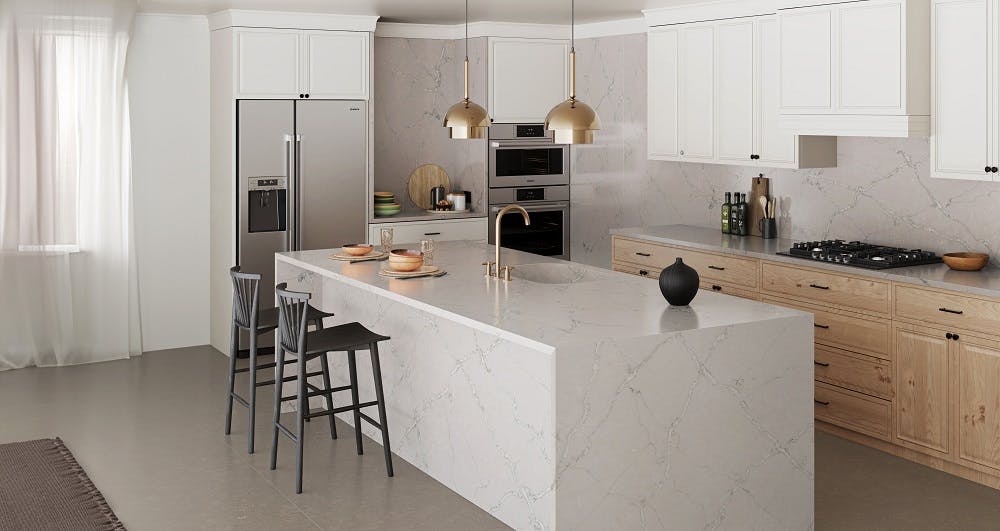
Silestone vs Quartz: What Exactly Is the Difference?
Home » Blog & Events » Silestone vs Quartz: What Exactly Is the Difference?
If you're planning a kitchen remodel, you've probably started thinking about countertop materials. There are so many options on the market these days that it can take time to decide which is suitable for your needs. In this post, we'll compare two popular countertop materials: Silestone and quartz, which are technically the same. How is this? Let's see it.
What is Silestone?
Silestone is a popular countertop material due to its benefits. It is manufactured from premium minerals and the most advanced and sustainable recycled materials on the market that inhibit the growth of bacteria and microorganisms, as well as being brighter and smoother than other countertop materials.
The colour factors and properties included in the manufacturing process give Silestone a unique look that stands out among all other types of countertops. Cosentino, a leader in kitchen design products, makes it. So, in short: Silestone is a brand name for countertops made out of premium natural minerals and recycled materials.
What is quartz?
Quartz has several benefits that make it an attractive choice for many homeowners. The quartz used in these countertops is a hardy and visually appealing mineral mined and manufactured into surfaces by various brands worldwide. The manufacturing process of quartz surfaces generally involves 90% ground quartz, reducing environmental impact.
Quartz countertops are also naturally colourful and durable, meaning they do not require any additional treatment or maintenance to preserve their appearance over time. Additionally, quartz countertops are scratch-resistant and heat-resistant, making them an excellent choice for busy households with children or animals running around.
4 benefits of Silestone
Now that we have the difference clear, let us show some of the benefits of using Silestone for your countertops.
Heat, freezing, and corrosion-resistant
Silestone is a popular choice for countertops because it is heat, freezing, and corrosion-resistant. It is made from premium natural minerals. These are one of the most robust materials on the market, and are also non-porous, making it resistant to stains and bacteria.
Durability
One of the most significant benefits of Silestone is its durability. This material is one of the most durable for your countertops, and it can withstand a lot of wear and tear. You won't have to worry about breaking or chipping easily, and you can enjoy its beauty for many years.
Maintenance and cleaning
One of the benefits of Silestone is that it is very easy to maintain and clean. With only a 0.5% absorption rate, this material does not require special cleaners or sealants and is also stain-resistant. You can simply wipe it down with a damp cloth and soap or other household chemicals to keep it looking like new.
Wide design and colour selection
Silestone offers a wide variety of colours, styles, and finishes to choose from, so you can find the perfect match for your kitchen or bathroom. Quartz is also available in many colours, but Silestone may have a slightly wider selection to choose from. Some examples of colours are cream, white, and light grey, while patterns like plain, veined, and fine grain are also popular.
In conclusion
Quartz is a naturally occurring material found in abundance around the world. It is one of the hardest minerals on earth, making it an ideal choice for countertops.
Silestone, on the other hand, is a hybrid surface made from premium natural minerals and recycled materials manufactured by Cosentino. It is a branded material chosen for its elegance, durability, hardness, and heat resistance, which can bring a much brighter and smoother look to your countertops.
FAQ
Is Silestone high-end?
Silestone is made from natural minerals and recycled materials. It is considered to be of high quality and used in luxury homes. It offers an expansive colour palette and is available worldwide, making it an attractive choice for many homeowners. This makes it an ideal choice for a long-lasting countertop material that will look great for years to come.
Is Silestone a brand of quartz?
Silestone® is a hybrid surface made from premium natural minerals and recycled materials that is specially engineered to have a polished and lustrous surface. It has the same general characteristics as granite and marble but offers a brighter look than those materials. Silestone is popular for countertop applications due to its durability and resistance to staining, making it an ideal choice for areas that experience frequent use in the home.
Is Silestone more expensive than quartz?
There is no definitive answer to this question since pricing can vary depending on several factors, such as the type of Silestone or quartz you select, the size and complexity of your project, and the location of your home. However, in general, Silestone tends to be slightly more expensive than quartz due to its stylish design and flexibility.

 Back
Back







